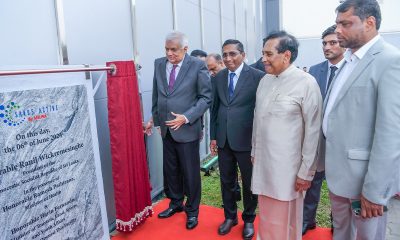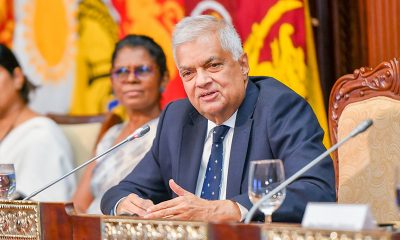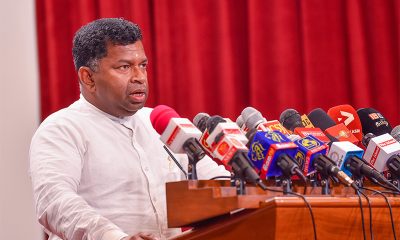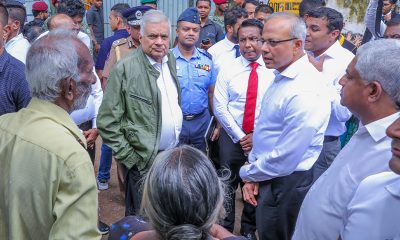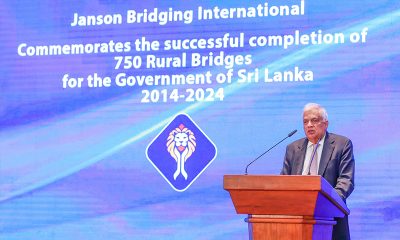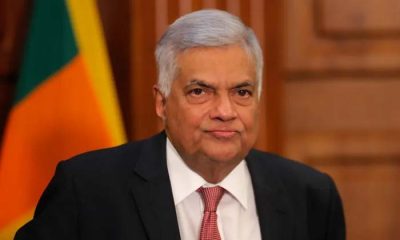News
Now is the most opportune moment to invest in Sri Lanka’s renewable energy sector – President
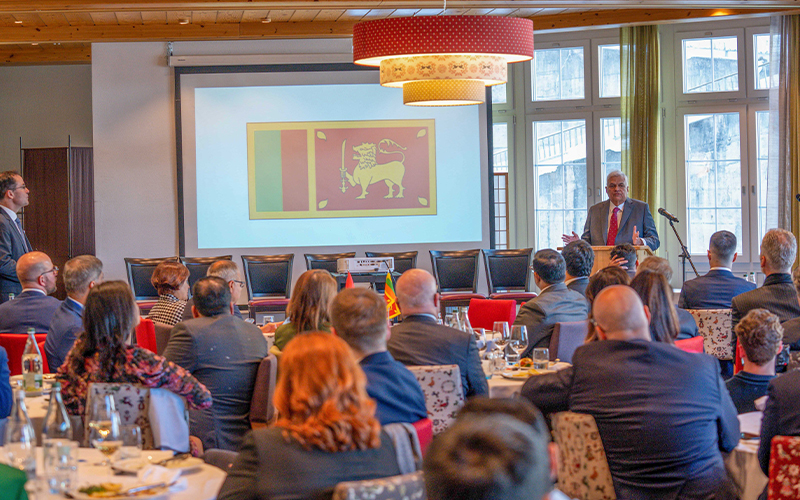
President Ranil Wickremesinghe highlighted the present as an opportune moment for investing in Sri Lanka’s renewable energy sector, expressing confidence in its potential to yield substantial benefits for both stakeholders and consumers in the coming decades.
The President also underscored that investors venturing into this sector can anticipate a comprehensive and unwavering policy framework in the realm of renewable energy.
President Ranil Wickremesinghe made these remarks during his address at the “Green Technology Forum” convened on January 15 in Davos, Switzerland. The event was coordinated by the Swiss-Asian Chamber of Commerce.
Speaking on the theme of “Paving the way to an energy secure Sri Lanka,” President Ranil Wickremesinghe highlighted the substantial potential of Sri Lanka’s renewable energy sector. He further outlined the government’s initiatives over the past two years to establish an investment-friendly environment in the renewable energy sector.
Emphasizing Sri Lanka’s dedication to addressing climate change, the President elaborated on various measures, including the “Tropical Belt Initiative,” presented at the COP28 conference in Dubai.
Highlighting Sri Lanka’s commitment to sustainable and green development, the President emphasized the nation’s ambitious plans and determination to achieve net-zero emissions by 2050.
President Wickremesinghe underscored the pivotal role of the rapid renewable energy plan, describing it as a key component of Sri Lanka’s comprehensive efforts towards sustainable development and a crucial step in ensuring energy security.
Following is the full speech delivered by President Ranil Wickremesinghe at the Green Technology Forum in Davos, Switzerland.
I thank the Swiss Asian Chamber of Commerce and their partners in organising this event for the invitation to speak today.
Background: Green Energy and Climate Concerns
There is an urgent need for acceleration of global actions towards climate change mitigation. There have been multiple global forums which have resulted in numerous commitments towards this end. However, actions have fallen drastically short of commitments.
The fallout of this failure in global leadership is borne largely by developing nations of the global south. When periods of drought extend beyond normal, undermining agricultural production, our food security is in jeopardy. When hydropower gets disrupted due to delayed monsoons, our energy security is in jeopardy. Droughts are often followed by a deluge, leading to flash floods and landslides, disrupting lives and livelihoods of under-privileged communities in particular.
It is very evident that there is a disproportionate impact of the adverse outcomes of climate change on developing countries. This brings to light the issue of climate justice and the need for a stronger contribution from the advanced economies towards adaptation and mitigation efforts in the global south.
That being said, Sri Lanka will forge ahead with its efforts towards climate mitigation. We have also recently launched the Tropical Belt Initiative at the COP28 in Dubai – this creates a framework for catalysing private investment in forests, energy, oceans, mangroves, in the countries of the tropical belt.
Today I want to focus on one key aspect of such efforts, which is our drive towards renewable energy.
Renewable Energy in Sri Lanka: Building on History
In fact, Sri Lanka is a country with a long history of renewable energy. Since independence Sri Lanka developed an extensive network of hydropower, commissioning its first major hydro-power plant in 1950. Hydropower was able to provide for most of the country’s energy needs until the 1990s. Even today, hydropower accounts for around 40% of Sri Lanka’s installed electricity generation capacity.
With hydropower largely exploited to the optimal levels, there has been an increased effort to include wind and solar power generation to the national grid. The government is now accelerating this process to ensure that by 2030, 70% of Sri Lanka’s electricity needs are fulfilled by renewable energy sources.
To reach this target requires a large investment of up to USD 11.5 billion. However, until recently the framework for private investment in the renewable energy sector has not been very conducive. Over the last 2 years several measures have been taken by the government to correct these shortcomings and ensure an optimal investment climate for renewable energy is in place.
Financial Reform
The first step was to ensure cost reflective pricing. Between 2014 and 2022 electricity tariffs had not been adjusted. This resulted in major cash flow problems for the Ceylon Electricity Board that sometimes led to payment delays to power suppliers. However, from August 2022 we have shifted to a cost-reflective pricing structure. Accordingly, electricity tariffs are revised every quarter to reflect costs on a forward looking basis.
The CEB, which has long been a loss making entity, returned a profit in 2023, enabling it to settle significant levels of past debt along with some balance sheet structuring. The company now has a strong balance sheet, a far stronger cash flow position, and a pricing structure that ensures liquidity.
Rigidities in the feeding tariff has also been a concern of past investors. However, this has also been addressed with greater flexibility being introduced to the tariff options, including choices between fixed tariff and variable tariff formulas.
In addition to internal reform, we are also putting in place the framework to attract green financing. Sri Lanka has developed the Road Map for Sustainable Finance, Green Finance Taxonomy, the SDG Investor Map and the Green Bond Framework, that is currently under formulation, creates the enabling environment for Sri Lanka to have a robust engagement in climate finance. The availability of sustainable finance will be an added boost for renewable energy investments in Sri Lanka.
Legislative Reform
There have also been legislative barriers to large scale private investment in the renewable energy sector. Those legal hurdles have also been cleared through necessary amendments to the Electricity Act introduced in 2022.
Institutional Reform
Thirdly, the government is in the final stages of implementing unbundling of the Ceylon Electricity Board. This will result in greater financial and operational autonomy for the distribution, generation, and transmission arms of the CEB, resulting in competition and transparency. Whilst private participation in generation is already available, the unbundling process will open up opportunities for private participation in distribution as well.
This major reform, implemented with the support of the Asian Development Bank, will ensure the CEB operates at the frontier of efficiency, delivering the best outcome for consumers and the most competitive and efficient producers of electricity. The draft legislation for this reform was already been published last month.
Infrastructure Improvements
The ambition of 70% electricity from renewals also requires improved system efficiency and upgrades to integrate more renewable energy, particularly from 2026. Investments will be required in storage, transmission, and distribution, along with the ongoing private investments in generation. Plans for this integration up to 2030 are in place and have begun implementation.
Future Outlook
Following the major reforms implemented in the energy sector in the last 2 years, there has been renewed interest in this sector. There are already large scale solar and wind power projects that have commenced implementation. A major Indian player has commenced implementation of a 350MW wind power plant that is expected to be commissioned in 2025. The same player is considering a further USD 750 million investment in wind power.
Wind power is a major opportunity for Sri Lanka. A recent World Bank report indicates that off-shore wind power in particular has the potential to generate power far greater than Sri Lanka’s requirements. Considering this, Sri Lanka and India are in advanced stages of talks regarding grid inter-connection to enable Sri Lanka to export surplus electricity particularly to the fast growing industrial belt in the Southern part of India. There is also tremendous potential for the development of green hydrogen in Sri Lanka.
Conclusion
Sri Lanka has ambitious plans to fulfil its sustainable, green development agenda. By 2050 the country has committed to achieving net zero. The accelerated renewable energy plan is a key component of this overall effort and is also an essential step on the path towards energy security. Renewable energy will also drive down costs of generation since at present Sri Lanka is compelled to rely on high cost heavy fuels during the dry season. Sri Lanka is in the process of establishing an international climate university, which will continue to unlock opportunities in green energy.
It is clear that Sri Lanka’s renewable energy policy direction is underpinned by multiple motivations and drivers. Therefore investors can expect a high degree of policy continuity in this sector going forward as well. This is the best time to invest in Sri Lanka’s renewable energy journey, and I have no doubt such investments will generate significant value for shareholders and Sri Lanka’s consumers over the next several decades.
News
US sports envoys to Lanka to champion youth development

The U.S. Embassy in Colombo welcomed the U.S. Sports Envoys to Sri Lanka, former National Basketball Association (NBA) and Women’s National Basketball Association (WNBA) players Stephen Howard and Astou Ndiaye, from June 8 through 14.
The Public Diplomacy section of the U.S. Embassy said that it would launch a weeklong basketball program intended to harness the unifying power of sports, made possible through collaboration with Foundation of Goodness and IImpact Hoop Lab.
While in Sri Lanka, Howard and Ndiaye, both retired professional basketball players, will conduct a weeklong program, Hoops for Hope: Bridging Borders through Basketball. The Sports Envoys will lead basketball clinics and exhibition matches and engage in leadership sessions in Colombo and Southern Province for youth aged 14-18 from Northern, Uva, Eastern and Western Provinces, offering skills and leadership training both on and off the court. The U.S. Envoys will also share their expertise with the Sri Lanka Basketball Federation, national coaches, and players, furthering the development of basketball in the country. Beyond the clinics, they will collaborate with Sri Lankan schoolchildren to take part in a community service project in the Colombo area.
“We are so proud to welcome Stephen and Astou as our Sports Envoys to Sri Lanka, to build on the strong people-to-people connections between the United States and Sri Lanka,” said U.S. Ambassador Julie Chung. “The lessons that will be shared by our Sports Envoys – communication, teamwork, resilience, inclusion, and conflict resolution – are essential for leadership development, community building, equality, and peace. The U.S. Sports Envoy program is a testament to our belief that sports can be a powerful tool in promoting peace and unity.”
News
Rahuman questions sudden cancellation of leave of CEB employees

SJB Colombo District MP Mujibur Rahuman in parliament demanded to know from the government the reasons for CEB suspending the leave of all its employees until further notice from Thursday.
MP Rahuman said that the CEB has got an acting General Manager anew and the latter yesterday morning issued a circular suspending leave of all CEB employees with immediate effect until further notice.
“We demand that Minister Kanchana Wijesekera should explain this to the House. This circular was issued while this debate on the new Electricity Amendment Bill was pending. There are many who oppose this Bill. The Minister must tell parliament the reason for the urge to cancel the leave of CEB employees,” the MP said.However, Speaker Mahinda Yapa Abeywardena prevented Minister Wijesekera responding to the query and said that the matter raised by MP Rahuman was not relevant.
News
CIPM successfully concludes 8th Annual Symposium

The Chartered Institute of Personnel Management (CIPM) successfully concluded the 8th Annual CIPM Symposium, which took place on 31st May 2024. Themed “Nurturing the Human Element—Redefining HRM in a Rapidly Changing World,” the symposium underscored the pivotal role of human resource management (HRM) in today’s dynamic global landscape. Since its inception in 1959, CIPM has been dedicated to advancing the HR profession through education, professional development, and advocacy, solidifying its position as Sri Lanka’s leading professional body for HRM.
Ken Vijayakumar, the President of the CIPM, graced the occasion as the chief guest. The symposium commenced with the welcome address by the Chairperson, Prof. Arosha Adikaram, followed by the Web Launch of the Symposium Proceedings and Abstract Book by the CIPM President. The event featured distinguished addresses, including a speech by Chief Guest Ken Vijayakumar, President of CIPM, and an address by Guest of Honor Shakthi Ranatunga, Chief Operating Officer of MAS Holdings Pvt. Ltd., Sri Lanka.
The symposium also featured an inspiring keynote address by Prof. Mario Fernando, Professor of Management and Director of the Centre for Cross Cultural Management (CCCM) at the University of Wollongong, Australia.
Vote of Thanks of the inauguration session was delivered by Dr. Dillanjani Weeratunga, Symposium Co-chair.
The symposium served as a comprehensive platform for researchers to present their findings across a wide range of critical topics in HRM. These included Cultural Diversity and Inclusion, Talent Development and Retention, Ethical Leadership and Corporate Social Responsibility, Adapting to Technological Advancements, Mental Health and Well-being at Work, Global Workforce Challenges, Employee Empowerment, and Reskilling and Upskilling.
The plenary session was led by Prof. Wasantha Rajapakse. Certificates were awarded to the best paper presenters during the valedictory session, followed by a vote of thanks delivered by Kamani Perera, Manager of Research and Development.
The annual symposium of CIPM was a truly inclusive event, attracting a diverse audience that spanned undergraduates, graduates, working professionals, research scholars and lecturers. This widespread interest highlights the symposium’s significance in the field of HRM, offering a unique opportunity for everyone to network and learn from scholarly brains.The CIPM International Research Symposium was sponsored by Hambantota International Port, Sri Lanka Institute of Information Technology (SLIIT), E B Creasy & Co. PLC, and Print Xcel Company.


